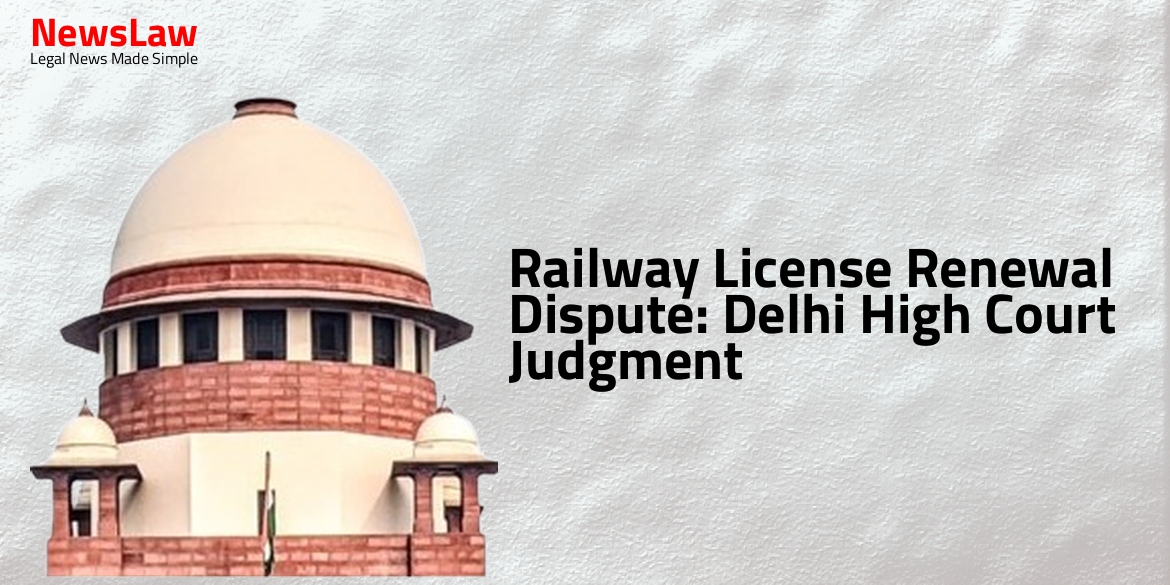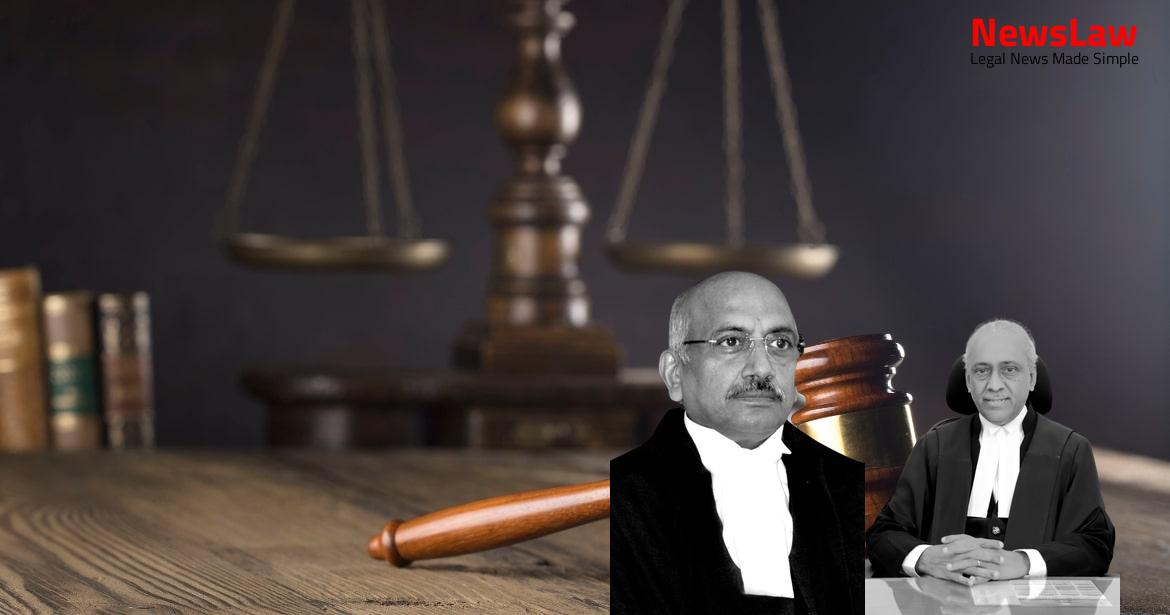In a significant legal battle before the Delhi High Court, a judgment was passed on the Railway License Renewal Dispute. The case involved multiple petitioners and the Northern Railway as the respondent. The court addressed critical issues surrounding license renewal, policy compliance, and equitable rights. This summary provides insights into the court’s decision and its implications on railway licensing practices. #DelhiHighCourt #RailwayLicense #LegalDispute
Facts
- Petitioner no.1 runs three MPS at Bareilly Railway Station.
- Petitioner no.2 runs one MPS at Moradabad Railway Station.
- Petitioner no.3 runs one MPS at Haridwar Railway Station.
- The petitioners were forced to convert their stalls/trolleys to MPS in 2017 by the Northern Railway.
- Different Master License Agreements were executed between the petitioners and respondent no.2 on different dates.
- The agreements had a tenure of five years from the date of conversion of stall/trolley until 21.12.2022 with no provision for extension or renewal.
Arguments
- Petitioners contend that their licenses have expired and they have no right to compel the respondents to extend them.
- The 2017 Policy is deemed legally sound and universally applicable without discrimination.
- The Karnataka High Court dismissed a similar challenge against the 2017 Policy in a previous case.
- The petitioners had benefited from the 2017 Policy’s tenure of five years and cannot contest it now.
- The petitioners argue that Paragraph 1744 of the Indian Railways Commercial Manual is violative of certain sections.
- They claim that stalls/trolleys allocated before 05.09.2017 should continue under past practice.
- The petitioners are seeking to challenge Clause 5 of the 2017 Policy as violative of various constitutional rights.
- The petitioners state a legitimate expectation for license renewal based on historical practices.
- Petitioners argue that the respondents’ refusal to renew their licenses is arbitrary and unconstitutional.
- They argue that extension of contract due to Covid-19 was arbitrary compared to other railway zones.
- The petitioners believe they should be entitled to a license extension proportional to reduced fees during a foot traffic decline.
- The conversion of miscellaneous stalls under the MPS units is claimed to be under coercion and economic duress.
- Petitioners content that the use of force during conversion was not adequately addressed in their licenses.
- The argument regarding reserved categories undergoing re-tendering processes is presented.
- It is stated that there is no fundamental right to trade at a specific public space, subject to reasonable restrictions.
- The maintainability of the petitions is challenged citing exclusive jurisdiction clauses in the license agreements.
- The respondent argues that the situs of the Railway Board alone does not confer jurisdiction on the court.
- The respondent emphasizes that the 2017 Policy prevents monopolization of licenses and promotes equal opportunity.
- The petitioners were informed that there would be no renewal under the new policy, as per Clause 11.
- The voluntary submission of applications by petitioners for conversion to MPS units is highlighted.
- The petitioner signed a contract for a non-renewable period of five years with eyes wide open.
- The petitioner cannot now attempt to revert back to a policy that is no longer in effect.
- The case cited by the petitioner regarding non-renewal of license was pertaining to a different policy, not applicable in this scenario.
- The petitioner cannot seek the benefits of an outdated policy after benefiting from the contract under the current policy.
Analysis
- The petitioners’ contention regarding renewal or extension of their license beyond the 5-year tenure stated in the 2017 Policy is not valid.
- The 2017 Policy explicitly mentions that there shall be no extension or renewal of MPS units, but current licensees can participate in a fresh bid if eligible.
- The argument of ‘legitimate expectation’ for renewal of licenses by the petitioners lacks merit as it goes against the clear terms of the policy.
- The jurisdiction of the Court to entertain the writ petitions is established based on the location of the authority to whom the writ is to be issued.
- Determinations regarding the non-operation period of contracts and extensions were made by the respective zonal/divisional railways in accordance with ground realities.
- The extension of license periods due to force majeure events, like the Covid-19 lockdown, was done in compliance with relevant official communications and policies.
- Reservation quotas and sub-quotas for various categories in allotment of MPS units were outlined in the correspondence and were to be adhered to.
- Policy decisions by the railways, such as re-tendering MPS units after the tenure, do not violate any fundamental rights or statutory provisions.
- The assertion that licenses constitute a vested right to perpetual renewal is contrary to the nature of licenses as defined in the Transfer of Property Act.
- The Supreme Court’s decision on license renewals under the 2010 Catering Policy is distinguished from the circumstances in the present case.
- The contentions regarding inequalities, opportunities, and reservation within the MPS allotment framework were addressed based on constitutional principles and policy provisions.
- The terms and conditions governing the license agreements, including the non-renewable clause in the 2017 Policy, were binding on the petitioners.
- The specific part (STA) of the judgment addresses various arguments put forward by both the Petitioner and Respondent.
- The judgment carefully considers the evidence and legal precedents presented by both parties.
- It highlights the key points of contention and provides a thorough analysis of each point raised.
- The court’s reasoning and conclusions in this section are crucial for determining the outcome of the case.
- This part of the judgment demonstrates the adherence to legal principles and the fair consideration of all arguments.
- The Karnataka High Court rejected a challenge to the 2017 Policy in the case of Gulfeeza Begum v. Union of India.
- The court held that the 1st respondent had previously granted relaxation based on changes in examination patterns, but it cannot be claimed as a right by petitioners seeking mandamus.
- A writ of Mandamus cannot be issued to direct the respondents to enact laws or frame rules under Article 226.
- Mandamus lies for enforcement of fundamental rights, statutory rights, or related fundamental duties.
- The breach or threat to breach a fundamental, statutory, or enforceable equitable right is necessary for issuing a writ of Mandamus.
- Individual license agreements and the 2017 Policy both contain an arbitration clause for aggrieved petitioners.
- The arbitration clause can be invoked if petitioners are dissatisfied with the extension due to Covid-19 or wish to claim damages.
- Petitioners are free to initiate appropriate proceedings through the arbitration clause.
Decision
- Existing bookstalls, misc. stalls, chemist stalls to be given option to convert to MPS by paying license fee.
- No new allotments or extensions for existing stalls will be done by the railways.
- Existing licensees given two options: convert to MPS for 5 years or continue till current agreement expires.
- Petitioners opted for conversion to MPS under the 2017 Policy.
- Petitioners granted 3 months to vacate stalls after conversion.
- Renewal of license considered for miscellaneous stalls/trolleys conversion to MPS.
- Common issues addressed since many petitions involve Northern Railway.
- All pending applications disposed, petitions deemed maintainable.
Case Title: LAXMAN PRASAD & ORS. Vs. UNION OF INDIA & ORS. (2024:DHC:4452)
Case Number: W.P.(C)-9746/2023



